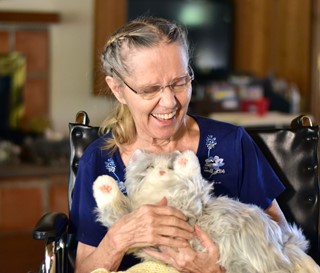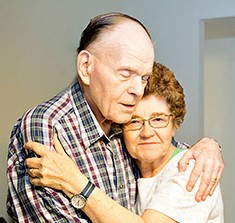Supportive Care for Dementia

Enhancing quality of life
Family members often feel overwhelmed, anxious and isolated while caring for a loved one with Alzheimer’s or other types of dementia. We offer comprehensive support in the early and moderate stages of the condition. Our compassionate staff are committed to improving quality of life with new ways of communicating that touch the heart and bring moments of joy.
Our Supportive Care for Dementia program is offered at no cost to families. Some only need it a short time to learn behavior management techniques. Others want support much longer. Either way, we are here for you.
Guiding an Improved Dementia Experience (GUIDE)
The Centers for Medicare and Medicaid Services has chosen Hospice of the Valley to implement an innovative model of care called (CMS) GUIDE (Guiding an Improved Dementia Experience). The program takes a comprehensive approach to providing high-quality, patient-centered dementia care — including respite care — to support family caregivers, as well as persons with dementia who live alone. To qualify, applicants must be enrolled in Medicare Parts A and B (not an Advantage Plan) and have early, moderate or advanced dementia. Learn more about GUIDE, which continues through 2032, by calling (602) 636-6363.
QUIET MOMENTS PROGRAM
Every dementia patient is unique and finding out what will most enrich each individual—is what our Quiet Moments program is all about. Our goal is to find the key that will unlock someone’s mind and heart—and usher in a little warmth, light and happiness.
Whenever you need help or advice, you can call and talk directly to a nurse or social worker, there's someone to turn to any time of day or night—never an answering service. (602) 636-6363
Home visits from a dementia educator who teaches behavior management strategies for Alzheimer’s disease and other dementias, and helps with medications, placement options and living wills.
Gillian Hamilton, MD, PhD, a nationally recognized geriatrician and dementia expert, can answer your questions by phone and consult with your loved one’s physician if desired.
Richard and Barbara Yavitt have been married nearly 60 years, caring for one another in sickness and in health. Now she’s caring for him at home, through the advancing stages of Alzheimer’s disease, with help from Supportive Care for Dementia program.
Family Testimonial
 Mabel Sawyer gives her husband Bob eight hugs six times a day. It’s the best medicine a wife could offer—especially to a husband with Alzheimer’s disease. “Those hugs mean so much,” she says.
Mabel Sawyer gives her husband Bob eight hugs six times a day. It’s the best medicine a wife could offer—especially to a husband with Alzheimer’s disease. “Those hugs mean so much,” she says.
But who’s there to hug Mabel?
After enrolling in Hospice of the Valley’s Supportive Care for Dementia program, the Sawyers receive home visits from dementia educators, 24/7 phone access to a nurse and phone consults with a physician who specializes in dementia.
Plus, once a week, volunteer Roman Obrycki visits to give Mabel some time to herself. “Bob and I play mahjong together on the computer,” Obrycki said. “We look at family photo albums. We sort pens and pencils in his collection. We keep busy.”
Mabel appreciates having a sympathetic ear, even in the middle of the night. “Once I was so upset, and the nurse listened and got me calmed down,” Mabel Sawyer said. “I could talk without feeling embarrassed. I could cry and let it out.”
Dr. Gillian Hamilton, program director, helped with medication issues. Bob suffered from a sleep disturbance that also kept Mabel up most of the night. Now, he is sleeping much better, and so is Mabel.
At 87, she was forgetting things and losing her eyesight. She couldn't take care of herself, her home—even her beloved dog. Thanks to a caring friend who reached out to Hospice of the Valley, Barbara is now safe and happy… and so is her pooch!
Dr. Gill Hamilton is Medical Director for Hospice of the Valley’s Supportive Care for Dementia program. She also oversees an innovative Hospice and Palliative Care internship that provides students with clinical instruction and a certificate in this specialized care. The program has had a huge impact on ASU students and the lives of individuals living with dementia.
